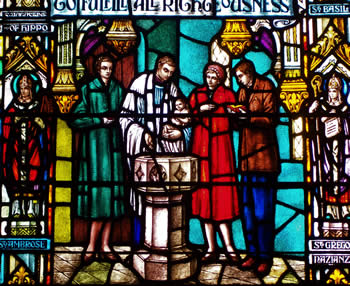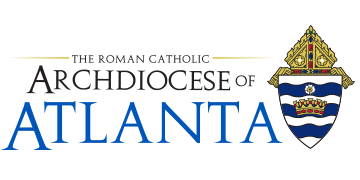Jesus said, “Let the children come to me, and do not prevent them; for the kingdom of heaven belongs to such as these.” From the earliest years of the Church, not only adults, but also children have been joined to Jesus and His Church through the sacrament of Baptism. Like all of the sacraments, Baptism is not only a sign of faith, but also a means of grace. This means that it has a real spiritual effect in the soul of the baptized infant. Responding to Jesus’ words to Nicodemus that “No one can enter the kingdom of God without being born of water and the Spirit1,” the Catholic Church has always placed the highest value on the Sacrament of Baptism, believing that through Baptism, the soul is cleansed of original sin, and a person becomes a child of God, and an heir to eternal life. For this reason, the Church has always striven to make sure that young children are not deprived of the grace of Baptism, obliging Christian parents to baptize their infants within the first few weeks of life2. This great urgency is redoubled if it appears that an infant may be in danger of death, as it would be a great loss for a child to depart this life without the grace of Baptism.
The Effects of Baptism
 Jesus’ departing words at the end of St. Matthew’s gospel are: “Go, therefore, and make disciples of all nations, baptizing them in the name of the Father, and of the Son, and of the Holy Spirit, teaching them to observe all that I have commanded you3. ” Baptism makes one a disciple of Jesus, someone who follows him and learns from Him. For this reason, adults must come to an understanding and trust of Jesus’ teachings before coming to Baptism. Infants are too small to understand Jesus’ teachings intellectually, but they too receive the gift of faith in Baptism, a gift that has to be nourished, especially by their parents and godparents, as they grow in age. All who have become disciples of Christ through Baptism are by that token joined to his Church, the community of all who are united to Christ. This means that Baptism brings the obligation to live as a Christian, following the commandments of Christ and His Church. The Christian life, beginning with Baptism, is a constant process of strengthening that communion, through faith, sacraments, and life, so that one day it might become perfect in heaven.
Jesus’ departing words at the end of St. Matthew’s gospel are: “Go, therefore, and make disciples of all nations, baptizing them in the name of the Father, and of the Son, and of the Holy Spirit, teaching them to observe all that I have commanded you3. ” Baptism makes one a disciple of Jesus, someone who follows him and learns from Him. For this reason, adults must come to an understanding and trust of Jesus’ teachings before coming to Baptism. Infants are too small to understand Jesus’ teachings intellectually, but they too receive the gift of faith in Baptism, a gift that has to be nourished, especially by their parents and godparents, as they grow in age. All who have become disciples of Christ through Baptism are by that token joined to his Church, the community of all who are united to Christ. This means that Baptism brings the obligation to live as a Christian, following the commandments of Christ and His Church. The Christian life, beginning with Baptism, is a constant process of strengthening that communion, through faith, sacraments, and life, so that one day it might become perfect in heaven.
Who Can be Baptized?
Jesus instructs His disciples to baptize all nations, and, indeed, Baptism is open to all who are not already baptized4. For infants, except in the immediate danger of death, it is necessary that at least one of the parents, or one who holds their place, consent to the Baptism. Because Baptism not only imparts grace, but also brings obligations, it is also necessary that there be a realistic hope that the child will be brought up in the Catholic faith5. It is a sad moment when someone who has received the grace of Baptism abandons it together with the practice of their faith. It sometimes happens that parents who are not living in perfect communion with the Catholic Church desire for their children to be baptized. Such children are never to be denied Baptism, as they are not responsible for any failing of their parents.
What are the Requirements for Baptism?
In order to help the parents prepare for Baptism, and to help the infants to grow in faith as they grow in age, the Church has certain requirements for Baptism. Each child should have one, or more frequently two, godparents. If there are two godparents, one should be a man and the other a woman. The godparents’ role is to help the child’s parents in their task of teaching the Catholic faith to their children. Because their task is to model the Christian life for the baptized child, it is necessary that each godparent be someone who is a confirmed adult Catholic who lives and practices his faith6. They may be married or single, but may not be married outside the Catholic Church. Non-Catholic Christians can be present as a Christian witness, but because they are not prepared to share the fullness of the Catholic faith, cannot serve as godparents. Parishes may establish other requirements for the reception of Baptism, often requiring a preparation class7 for the parents or godparents, but these requirements are not intended to prevent anyone from receiving the sacrament, and should be adjusted in special cases8.
What Must I do to have my Children Baptized?
It is a good idea to speak with your parish priest before your child is born to find out more about the preparation for Baptism in your parish. Baptism is a joyful occasion, as a newborn child receives supernatural life to complete the natural life that God has given to them. Your priest will be able to help you to make the necessary preparations, so that your baby’s Baptism may be a moment of grace and joy for everyone involved. Older children who have not yet been baptized should also be brought for Baptism as soon as possible, and your priest can help you prepare for Baptism in those circumstances, as well.
Footnotes
- John 3:5
- Canon 867
- Matthew 28:19-20
- Canon 864
- Can 868
- See Canons 872-4
- CIC 851 – Parents to be suitably instructed
- Cf. Canon 843

